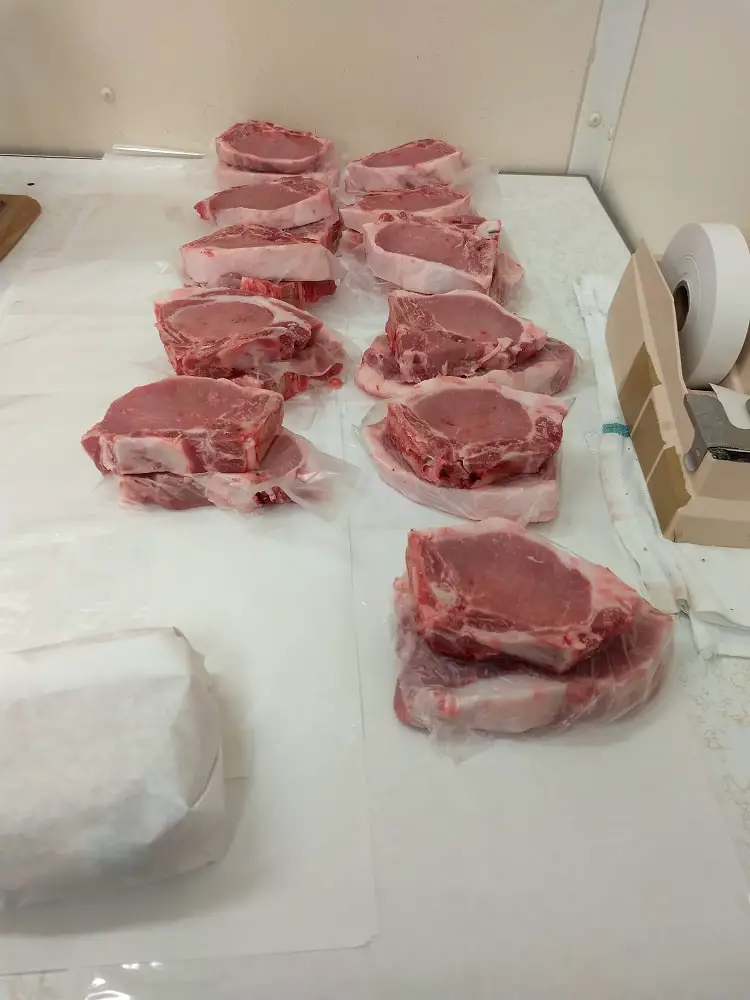Salary, Job Description, How To Become One, and Quiz
.jpg)
Slaughterers And Meat Packers
Slaughterers And Meat Packers perform nonroutine or precision functions involving the preparation of large portions of meat. Work may include specialized slaughtering tasks, cutting standard or premium cuts of meat for marketing, making sausage, or wrapping meats. Work typically occurs in slaughtering, meat packing, or wholesale establishments.
Table of contents
What they do
Slaughterers And Meat Packers perform nonroutine or precision functions involving the preparation of large portions of meat. Work may include specialized slaughtering tasks, cutting standard or premium cuts of meat for marketing, making sausage, or wrapping meats. Work typically occurs in slaughtering, meat packing, or wholesale establishments.
- Remove bones, and cut meat into standard cuts in preparation for marketing.
- Sever jugular veins drain blood and facilitate slaughtering.
- Tend assembly lines, performing a few of the many cuts needed to process a carcass.
- Shackle the hind legs of animals to raise them for slaughtering or skinning.
Typical day
On a daily basis, Slaughterers and Meat Packers remove bones and cut meat into standard cuts in preparation for marketing. They tend assembly lines, performing a few of the many cuts needed to process a carcass.
A typical day for a Slaughterer and Meat Packer will also include:
- Grind meat into hamburgers, and into trimmings used to prepare sausages, luncheon meats, and other meat products.
- Slaughter animals in accordance with religious law, and determine that carcasses meet specified religious standards.
- Slit open, eviscerate, and trim carcasses of slaughtered animals.
- Trim, clean, or cure animal hides.
- Saw, split, or scribe carcasses into smaller portions to facilitate handling.
Other responsibilities
Besides their typical day, Slaughterers and Meat Packers also wrap dressed carcasses or meat cuts. They may also stun animals prior to slaughter.
On a weekly to monthly basis, Slaughterers and Meat Packers cut, trim, skin, sort, and wash viscera of slaughtered animals to separate edible portions from offal. They might also grind the meat into hamburgers, and into trimmings used to prepare sausages, luncheon meats, and other meat products.
In addition, they trim head meat and sever or remove parts of animals’ heads or skulls.
Although specific duties may vary, many of them trim, clean, or cure animal hides.
To some Slaughterers and Meat Packers, it is also their responsibility to saw, split, or scribe carcasses into smaller portions to facilitate handling.
What is the job like
Job satisfaction
Is this job meaningful
61% said they were satisfied with their job and 46% said they found their job meaningful.

I am a Meat Processor. I cut and wrap meat for people to take home.
A typical day for me is up at 5 am to tend my own livestock and shower before I go to work.
Once at work the pace is generally fast with the Cows and Pigs coming in at 8am to be processed and be done by 1pm where they are then moved to a cooler for aging.
After a short lunch, we clean up and then start breaking down beef and pork that is already done being aged. Breaking it down into primal cuts to be further divided into counter recognizable cuts where they are then wrapped, labeled, and stored in a freezer ready for purchase or ready to go to the customer. After the final counter cuts are wrapped and stored we move to the end process which is scraping the beef or pork off the bones to become ground beef, sausage, Jerky or links as well as preparing pork for the brine to become bacons and ham.
Finishing out our day around 8pm we clean the entire processing, cutting, wrapping, and prep areas from top to bottom, setting it up for the next day.
Sprinkled throughout the day are tending to customers, answering phone calls, processing paperwork, and some retail tasks however the majority of our day is spent taking beautiful, well cared for livestock and turning it into beautiful ingredients.
Work environment
Cons
Firstly I would say that the biggest hurdles or cons are going to be that the industry is incredibly busy, your hours are long, the workload is high, it is by no means a clean job, and you generally gain insight into the flaws in the industry on a national scale (I work for a local custom processing business where we deal exclusively with individual local small farmers so for us we have the divide of locality and minority compared to say JBS and their intake from multi-million animal feedlots).
Pros
However the silver lining is that you gain a deeper connection to the resources and people responsible for your local supply chain, you gain knowledge that you can take anywhere, there’s no shortage of job security and lastly, you’ll find the character of your coworkers is always favorable. There’s a certain personality type that finds its niche in this line of work so you’ll rarely ever hate or have issues with coworkers. There are very few bad days.
Advice to students who are interested in this career path
Anyone interested in this line of work should be sure to carry a good sense of humor, a strong constitution, and a big work ethic. Students attending large animal sciences will thrive in this line of work as well as anyone who would like a closer look at where their food comes from.
For those who aren’t students simply finding your opening is all it takes. Always keep checking with your local processors to see if they need help and prepare to start as a meat wrapper or front end help. It in many ways is entry level friendly! Once you’re hired many meatsmiths are all too happy to train up the next generation so to speak as the bottleneck we’ve seen arise from covid merely took what was already there and intensified it. The largest hurdle is learning safety and sanitation regulations; but past that it’s an incredibly rewarding line of work to know that you are helping put a farmer’s love and labor into the last leg of its journey.
Pros
Suitable for people who like practical and hands-on work.
Suitable for people who value relationships between co-workers and customers and want to work in a friendly non-competitive environment.
This career is perfect for people who love to work indoors.
It is very easy to get into this career. Little or no previous work-related skill, knowledge, or experience is required for this career.
Cons
Not suitable for people who like to help and teach others.
One of the lowest paying jobs.
How much do they make
Average salary
Average hourly wage
Entry-level Slaughterers And Meat Packers with little to no experience can expect to make anywhere between $23,170 to $27,050 per year or $11 to $13 per hour.
| Salary by experience | Annual | Hourly |
|---|---|---|
| Highest (Top 10%) | $40,000 | $19 |
| Senior (Top 25%) | $35,980 | $17 |
| Median | $30,710 | $15 |
| Junior (Bottom 25%) | $27,050 | $13 |
| No experience (Bottom 10%) | $23,170 | $11 |
This table shows the top 10 highest paying industries for Slaughterers And Meat Packers based on their average annual salary.
| Salary by industry | Annual | Hourly |
|---|---|---|
| Animal Food Manufacturing | $32550 | $15.65 |
| Animal Slaughtering and Processing | $31310 | $15.05 |
| Merchant Wholesalers, Nondurable Goods | $30250 | $14.55 |
| Employment Services | $28820 | $13.85 |
| Food and Beverage Stores | $28160 | $13.54 |
View more salary by industries here.
Where can they work
Where can Slaughterers And Meat Packers work? Here is a table showing the top 10 largest employers of Slaughterers And Meat Packers including the average salary in that industry.
| Employers | Total Employed | Annual Salary | Hourly Wages |
|---|---|---|---|
| Animal Slaughtering and Processing | 72020 | $31310 | $15.05 |
| Employment Services | 2020 | $28820 | $13.85 |
| Food and Beverage Stores | 920 | $28160 | $13.54 |
| Animal Food Manufacturing | 50 | $32550 | $15.65 |
| Merchant Wholesalers, Nondurable Goods | $30250 | $14.55 |
What is the work day like
Working hours
Working schedule
How often do you use email in this job?
Telephone
How often do you have telephone conversations in this job?
Group discussions
How often do you have group discussions in this job?
Public speaking
How often does this job require you to do public speaking?
Level of competition
How much competitive pressure is in this job?
What is the work environment like
Office-style environment
Indoors in an environmentally controlled condition
Warehouse-style environment
Indoors in a non-controlled environmental condition such as a warehouse
Outdoors
Outdoors exposed to all weather conditions
Outdoors – Under Cover
Outdoors but under cover (e.g. structure with roof but no walls)
How to become one
Difficulty to become one
Required level of education
What level of education do you need to perform the job?
Relevant majors
Meat Cutting
Relevant work experience
How much related work experience do you need to get hired for the job?
On The Job Training
How much on the job training do you need to perform the job?
Should you become one
Best personality type for this career
People with this personality type likes practical and hands-on work. They prefer working with plants, animals, and real-world materials like wood, tools, and machinery.
People with The Builder personality type likes practical and hands-on work. They prefer working with plants, animals, and real-world materials like wood, tools, and machinery.
People with The Thinker personality likes to work with ideas that require an extensive amount of thinking. They prefer work that requires them to solve problems mentally.
People with The Artist personality likes to work with designs and patterns. They prefer activities that require self-expression and prefer work that can be done without following a clear set of rules.
People with The Helper personality type likes to work with people and in teams. They prefer work that allows them to build relationships with others.
People with The Leader personality likes to start and work on projects. They also like leading people and making many decisions.
People with The Organizer personality type likes to follow set procedures and routines. They prefer working with data and details more than with ideas.
You can read more about these career personality types here.
People who are suitable for this job tend to like work activities that include practical, hands-on problems and solutions. They like working with plants, animals, and real-world materials like wood, tools, and machinery.
They also like following set procedures and routines. They like working with data and details more than with ideas.
Take this quiz to see if this is the right career for you.
Work Values
Which values are the most important to a person’s satisfaction for this job?
You are someone who is results oriented. You prefer work that allows you to utilize your skills and abilities while at the same time giving you a sense of accomplishment.
You are someone who values job security, steady employment, and good working conditions. You also prefer work that keeps you busy all the time with something different to do every day.
You are someone who values job advancement and leadership roles. You prefer work that receives recognition for the work you do and jobs that are looked up to by others in the company and your community.
You are someone who likes to provide a service to others. You prefer a work environment where you can work with your co-workers in a friendly non-competitive environment.
You are someone who values a company that stands behind their employees. You prefer a work environment where everyone is treated fairly and is being supported by the company.
You are someone who likes to work on your own and make your own decisions. You prefer work that requires little supervision and are allowed to try out your own ideas.
Don’t know which career to pursue?
Take the career quiz to find careers that match your personality type.
Take The Career Quiz


.jpg)




.jpg)
.jpg)
.jpg)
.jpg)
.jpg)
